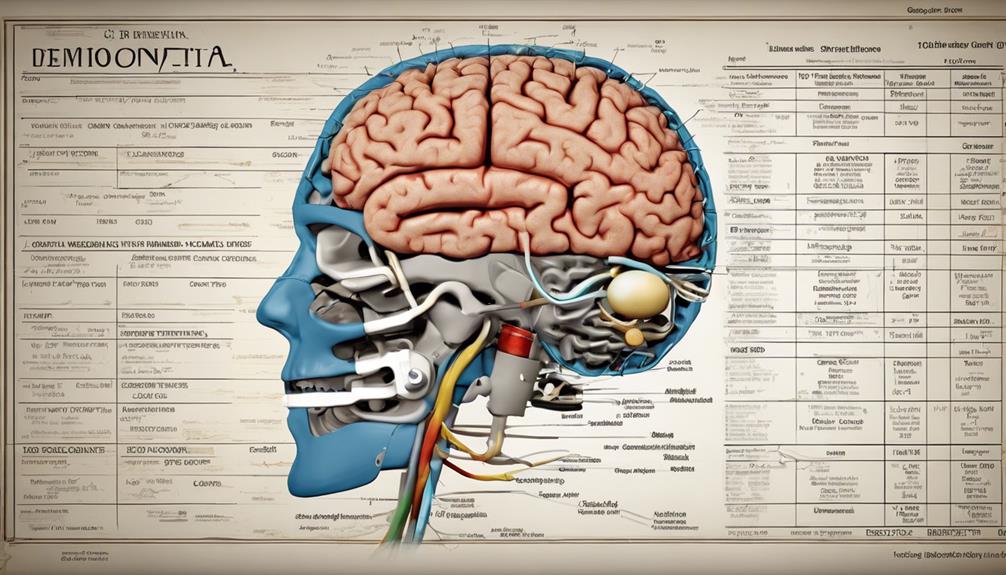Caring for a parent with dementia can be emotionally exhausting yet incredibly fulfilling. Watching the changes in our loved one’s mental abilities and behaviors highlights the importance of having the right resources to provide them with proper care.
From understanding the progression of the disease to honing our communication skills, every step we take is a profound act of love and resilience. But what happens when the challenges seem insurmountable, and we feel overwhelmed by the weight of responsibility?
Key Takeaways
- Recognize behaviors as communication signals
- Utilize nonverbal cues for enhanced understanding
- Prioritize caregiver self-care to prevent burnout
- Seek support from caregiver groups and counseling
Understanding Dementia Behaviors
Understanding the behaviors associated with dementia is essential for caregivers to provide the best possible support and care for their loved ones. Dealing with Alzheimer's disease and related progressive brain disorders can be challenging due to behavior changes like mood swings, memory loss, and communication difficulties. As caregivers, it's crucial to equip ourselves with practical strategies to navigate these challenges effectively. By understanding dementia behaviors, we can better anticipate and address the needs of our loved ones.
In providing caregiver support, it's vital to recognize that behavior changes are often a form of communication for individuals with dementia. By honing our communication skills, we can decipher these behaviors and respond appropriately. This not only helps in managing challenging behaviors but also fosters relationship improvements with our loved ones. Being proactive in understanding dementia behaviors enables us to create a more supportive and reassuring environment, promoting a sense of security and stability for those under our care.
Effective Communication Strategies

Navigating effective communication with a parent experiencing dementia involves utilizing body language and tone of voice to establish a positive atmosphere for interaction. When communicating with a parent with dementia, it's crucial to remember to:
- Minimize distractions and create a quiet environment.
- Use nonverbal cues like gestures and facial expressions to enhance understanding.
- Speak in simple words and short sentences to aid comprehension.
- Ask answerable questions that are easy to process.
- Break down activities into manageable steps and provide visual cues to assist in communication.
Managing Frustration and Stress
In managing frustration and stress while caring for a parent with dementia, it's essential to recognize personal limits and implement effective coping strategies. Caregivers often face challenging situations that can trigger frustration and stress. Understanding warning signs and taking steps to calm down physically and mentally are crucial in these moments.
Communicating needs assertively and addressing negative thought patterns can also help caregivers cope with the demands of caregiving. It's important to identify triggers for behavioral changes in parents with dementia to adapt care strategies accordingly. To prevent caregiver burnout and maintain well-being, seeking assistance from family, friends, or in-home care services is essential.
Accessing resources such as caregiver support groups and counseling services can provide valuable support and improve the overall caregiving experience. Remember, managing stress effectively is key to providing the best care for a parent with dementia.
Seeking Support and Resources

When caring for a parent with dementia, seeking support and resources is crucial for maintaining well-being and providing the best possible care. Here are some essential steps to consider:
- Explore Alzheimer's caregiver support groups and counseling services for guidance and emotional support.
- Utilize resources like Alzheimer's.gov, Alzheimer's Association, and Alzheimer's Navigator to find local services tailored to Alzheimer's care.
- Consider the potential benefits of Ginkgo biloba extract for cognitive recovery in dementia patients.
- Access advice from the Family Caregiver Alliance to help navigate the complexities of caring for a parent with dementia.
- Take advantage of in-home care options and seek support from family, friends, and neighbors while prioritizing your own self-care as a caregiver.
Self-Care Tips for Caregivers
Prioritizing our own well-being as caregivers for a parent with dementia is crucial to prevent burnout and provide the best care possible. Establishing boundaries and taking breaks when needed can help us manage the stress that comes with caregiving.
Seeking emotional support from friends, family, or support groups can provide us with a much-needed outlet for our feelings. Engaging in activities that promote relaxation and reduce stress, such as exercise or meditation, can benefit our mental and physical health.
It's essential to remember that taking care of ourselves allows us to be more effective in our role and provide better care for our parent with dementia. Joining support groups can connect us with others who understand our challenges and provide valuable insights.
Setting aside time for activities we enjoy, even if it's just for a short while each day, can help us recharge and stay resilient in the face of caregiving demands. Remember, our well-being matters too.
Frequently Asked Questions
How Do You Emotionally Deal With a Parent With Dementia?
We understand the emotional toll of caring for a parent with dementia. It can be overwhelming. Seeking support from others and engaging in self-care are vital.
Processing feelings of sadness and frustration is important. Open communication with family members can provide mutual support. Remember, you're not alone in this journey. It's okay to ask for help and take care of yourself too.
How Do I Deal With My Parents Dementia?
Dealing with a parent's dementia can be overwhelming, but it's important to remember that support is available.
We can navigate this challenging journey by educating ourselves about dementia, adapting our communication, seeking help from loved ones and organizations, and taking care of our own well-being.
What Should You Not Say to a Parent With Dementia?
When communicating with a parent with dementia, it's important to be mindful of our language and approach. Avoiding certain phrases can help prevent frustration and agitation. Statements like 'Don't you remember?' or correcting memories should be steered clear of.
Using simple language, providing validation, and avoiding pressure in conversations are key. By being empathetic and understanding, we can create a more supportive environment for our loved ones with dementia.
What to Do With a Parent Who Has Dementia?
When dealing with a parent who has dementia, several key priorities come into play:
- Prioritizing their comfort, safety, and emotional well-being is paramount.
- Maintaining a daily routine, using clear communication, and creating a hazard-free environment are essential strategies.
- Patience and understanding should guide interactions, and offering unwavering support through challenging moments is crucial.
It's also important to seek professional help and caregiver resources to ensure the best care for our loved one. This journey requires compassion and dedication from all involved.
Conclusion
In conclusion, when dealing with a parent with dementia, understanding their behaviors, using effective communication strategies, managing frustration, and seeking support are crucial.
Remember, caring for a loved one with dementia is a journey filled with challenges, but also moments of connection and love.
So, how can we approach this journey with compassion and empathy, knowing that we're doing our best to support our parent through this difficult time?









